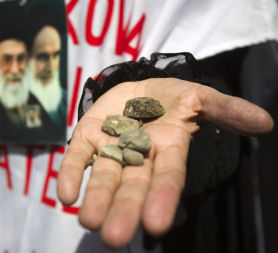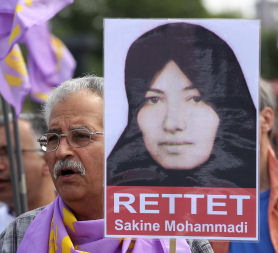Row over stoning of Iranian woman
The story of a woman sentenced to death by stoning in Iran has sparked international outrage. Channel 4 News speaks to campaigners and explains the laws surrounding a “medieval punishment”.
Warning: the accompanying report contains images you may find distressing.
Sakineh Mohammadi-Ashtiani, 43, was convicted of adultery in 2007 and sentenced to death by stoning. She was understood to be facing the barbaric punishment at any time, before an international campaign involving the British government, human rights organisation and celebrities sparked a retreat from the Iranian government.
The lawyer representing Ms Ashtiani has explained to Channel 4 News her apparent confession on state television could mean she will escape execution.
In her interview, Ms Ashtiani allegedly confessed to involvement in her husband’s murder and adultery.
Her face was blurred and her words translated from her local dialect into Farsi, making it impossible to authenticate what she is reported to have said.
Campaigner Mina Ahadi, who fled a death sentence herself in Iran 30 years ago and now heads the International Committee against Stoning and Execution, has said the fight is not over until Ms Ashtiani is pardoned.

Ms Ahadi told Channel 4 News: “The Islamic Republic of Iran has retreated to some extent due to international pressure and widespread coverage received by the international campaign to save Sakineh’s life.
“The regime has retreated from stoning on a number of occasions in the past but has executed the accused instead. The execution of Abdulla Farivar in Sari prison for the alleged crime of sex outside of marriage is a case in point. Therefore, Sakineh’s life is still in danger.
“The aim of the campaign to save Sakineh Ashtiani Mohammadi is for an official rescinding of her stoning and execution sentence and her unconditional release. Sex outside of marriage and the sexual relations of adults is their private affair. It is not a crime and must never be prosecuted.”
The international community sprang into action when Ms Mohammadi-Ashtiani’s son, 22-year-old Sajad Ghader-zade, risked his own safety to send out an impassioned plea for help in an open letter, saying there was “no justice” in his country.
In a letter obtained by Channel 4 News, Mr Ghader-zade wrote: “My mother and I are asking the people of the world to help us, and are deeply grateful for what has been done thus far.”
Amnesty International and the Global Campaign to Stop Killing and Stoning Women have also stressed that Ms Mohammadi-Ashtiani still faces imminent execution, and also warned that her son has been summoned for questioning by the Iranian authorities.
Success but others face same fate
Ms Ahadi added: “Even this limited retreat is a success for Sakineh and her children Sajad and Faride as well as all the activists of the campaign against executions and stoning and decent people everywhere.
“Our campaign has shown that we can force the regime to back down. The embassy’s press release will not stop us from intensifying our powerful campaign. The retreat, however limited, has shown that the regime is under pressure.
“Our campaign has shown that we can force the regime to back down.” Mina Ahadi
“I ask however that you step up your efforts for Sakineh Mohammadi Ashtiani, Mohammad Reza Hadadi (juvenile offender awaiting imminent execution), Zeinab Jalilvand (sentenced to death for ‘enmity against God’) and others awaiting execution and stoning. Our pressure is working.
“We must intensify it until we secure a victory for the people of Iran by saving the lives of Sakine and others. We mustn’t stop until we deprive the regime in Iran of this tool for suppression and murder.”
Foreign Office Minister Alistair Burt had earlier warned that if the execution went ahead, it would “disgust and appal the watching world”.
“Stoning is a medieval punishment that has no place in the modern world,” he said.
Click here for Foreign Office statement on stoning.
“The continued use of such a punishment in Iran demonstrates a blatant disregard for international human rights commitments which it has entered into freely, as well as the interests of its people.”
What does the law in Iran say?
Under Iran’s penal code, adultery is a “crime against God” for both men and women. It is punishable by 100 lashes for unmarried men and women, but married offenders are sentenced to death by stoning under Article 83.
Adultery must be proven either by repeated confession by the defendant, or the testimony of witnesses – four men or three men and two women.
However, the law also allows judges in “hodud”, or morality, crimes such as adultery to use their own “knowledge” to determine the case in place of direct evidence. This happened in Ms Mohammadi-Ashtiani’s case.
The penal code is also specific about the manner of execution and types of stones which should be used. Article 102 says men should be buried up to their waists and women up to their breasts, and Article 104 states that the stones used should “not be large enough to kill the person by one or two strikes; nor should they be so small that they could not be defined as stones”.
What is death by stoning?
The prisoner is buried either up to his waist (if male) or up to her shoulders (if female) and then pelted with stones by a crowd of volunteers until obviously battered to death.
Under the terms of most fundamentalist courts, the stones must be small enough that death cannot reasonably be expected to result from only one or two blows, but large enough to cause physical harm.
The average execution by stoning is extremely painful, lasting at least 10 to 20 minutes.
What is the situation at the moment?
The government in Iran has confirmed that stoning will not be included in the draft penal code being debated in the Iranian parliament at the moment – a major step away from the practice.
At the moment, 10 people face the punishment in Iran – according to human rights organisations – but a number have also been pardoned.
Read more

Celebrities including Robert Redford, Emma Thompson and Colin Firth backed the campaign to save Ms Mohammadi-Ashtiani, who had already been in prison for five years and received 99 lashes for having an illicit relationship – something she had denied.
She was convicted in 2006 of having had an “illicit relationship” with two men. She did confess at the time, but under duress and has since retracted the confession.
Her case was later reopened during the trial of a man accused of murdering her husband. She was convicted of adultery while being married by three of the five judges, despite her earlier conviction and punishment, and sentenced to death by stoning.
The three judges who found her guilty did so on “the knowledge of the judge” rather than hard evidence, a quirk in Iranian law which allows judges to make their own subjective determination on whether a person is guilty even in the absence of evidence in morality cases.
Her death sentence was confirmed by the Supreme Court on 27 May 2007.
Her case has been sent to the Amnesty and Clemency Commission a number of times, but her request for clemency was rejected on all occasions. She is being defended by one of the most prominent human rights lawyers in Iran, Mohammed Mostafaei.
Amnesty International told Channel 4 News Iran had already executed 126 people this year, despite being a party to the International Covenant on Civil and Political Rights, which requires even states that have not yet abolished the death penalty to restrict its use to “the most serious crimes”.
An Amnesty spokesman said that 10 people, seven women and three men, are awaiting stoning in Iran. There may also be more people under sentence of stoning, which the organisation is trying to confirm.
Since 2006, at least six people have been executed by stoning – five men and one woman.
Three others sentenced for adultery were eventually executed by hanging.
However, 15 people have been saved from stoning – two men and 13 women – largely by the efforts of human rights activists and lawyers.